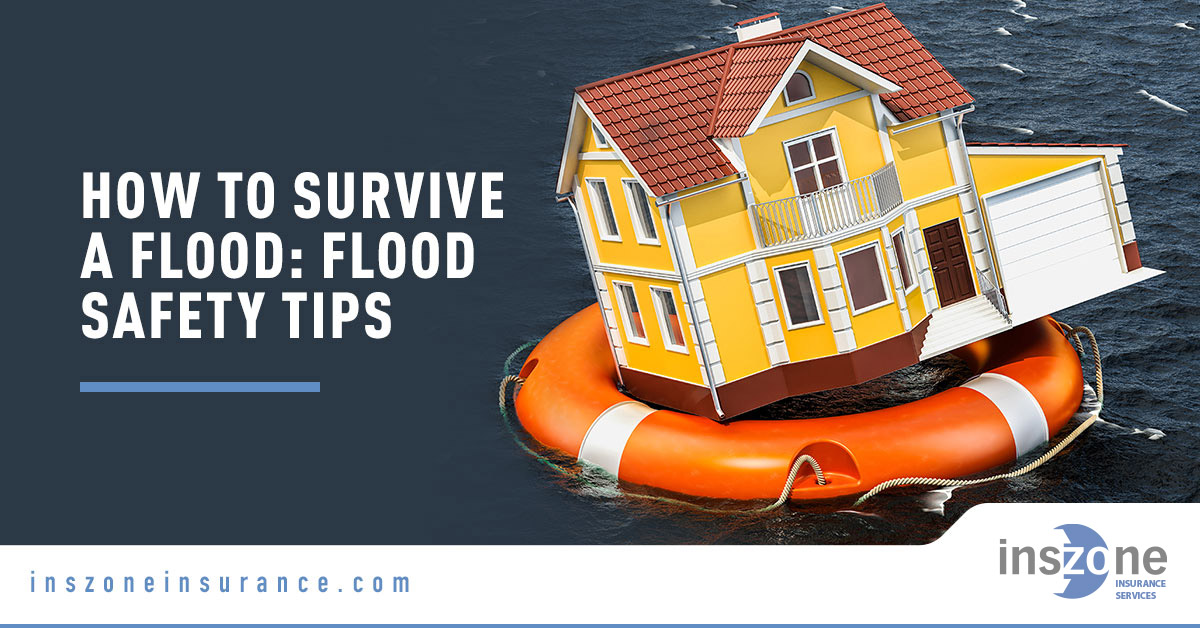Sudden heavy rainfall can lead to flooding in your home or business. In extreme cases, there can also be risk to your life and safety. In addition to drowning, exposure to pollutants in the flood water can pose health hazards. It may become toxic with sewage, chemicals and bacteria. There is an increased risk of contracting water-borne illnesses like cholera, typhoid fever, hepatitis A and malaria from standing flood water.
Preparation is key to surviving a flood. Here are some important steps you can take to increase your odds of surviving and thriving after a flood in your area:
Before the flood, you should:
-
- Sign up for alerts from the National Weather Service, FEMA, or other sources to get updated information about the weather and potential flooding in your area1.
- Know the difference between a flood watch and a flood warning and be prepared to evacuate at a moment’s notice if a warning is issued.
- Have an emergency survival kit ready with at least three days of supplies for everyone in the household, including water, food, flashlight, radio, phone chargers, batteries, first aid kit, medications, multi-purpose tool, sanitation and personal hygiene items, and copies of important personal documents2.
- Ensure your drainage systems are not clogged with debris; this could lead to flooding and property damage2.
- Get flood insurance and know your flood risk. You can check if your home is in a flood zone by visiting the FEMA Flood Map Service Center3.
- Take a household inventory and store important documents in a safe place. You can also use a camera or video recorder to document your belongings for insurance purposes4.
During the flood, you should:
-
- Listen to your local radio or television station for updates and follow the instructions of local authorities5.
- Have vaccination records handy (or know the year of your last tetanus shot) in case you get injured or exposed to contaminated water.
- If there is any possibility of a flash flood, move immediately to higher ground. Do not wait for instructions to move.
- If you have to evacuate, turn off all utilities at the main power switch and close the main gas valve. Do not touch electrical equipment if you are wet or standing in water.
- Do not walk, swim, or drive through floodwaters. Turn around, don’t drown. Six inches of moving water can knock you down, and one foot of moving water can sweep your vehicle away.
- Stay away from bridges over fast-moving water. They can collapse without warning.
- Avoid fallen power lines, poles, and wires. They can electrocute you.
- Watch out for falling trees and other debris that can injure you or damage your property.
After the flood, you should:
-
- If you evacuated, wait for officials to say it is safe before going home.
- Use flashlights or battery-powered lanterns, rather than candles, to reduce fire risk.
- Check for structural damage before entering your home. If you suspect any damage to water, gas, electric, or sewer lines, contact authorities.
- Clean and disinfect everything that got wet. Floodwater can contain sewage, bacteria, viruses, and other contaminants that can cause illness.
- Wear protective clothing, gloves, and boots when cleaning up. Avoid contact with floodwater or items that have been in contact with floodwater unless you are wearing rubber boots and gloves.
- Throw away any food that has been in contact with floodwater or that has been spoiled by lack of refrigeration5.
- Monitor your health and seek medical attention if you experience any symptoms such as fever, headache, nausea, vomiting, diarrhea, or wound infection.
Important aspects to consider as well
Medical and First Aid
Prepare a first aid kit that contains basic medical equipment and medications that you might need if you are displaced from your home. Keep it on an accessible upper floor or cabinet to protect it from getting contaminated by flood waters. Include mosquito repellant in this kit, as mosquitos thrive in wet conditions and are the biggest carriers of malaria.
Clean and Disinfect
Keep as clean as you can in flood conditions. Avoid touching contaminated water and items and disinfect your hands immediately if you make contact with it.
Confirm Water is Safe Before Drinking
Your water supply can become compromised in flood conditions. Stick with sealed bottled water whenever possible, or only drink municipal water that has been tested and confirmed as safe to consume.
Discard All Contaminated Items
From food and medicine to carpet and furniture, it is always safest to discard items that have been exposed to flood water. If it is a hard-surfaced item that can be thoroughly disinfected, you might be able to salvage it. Anything porous, absorbent or edible should be discarded.
Update Your Flood Insurance
Another key step for flood preparedness is making sure you have adequate flood insurance. Most homeowner policies do not include it, so you’ll have to seek it out on your own. Consider Inszone Insurance for flood protection. We’re an all-in-one insurance agency working with the best carriers to help you connect with the right flood insurance coverage for your needs and situation.





